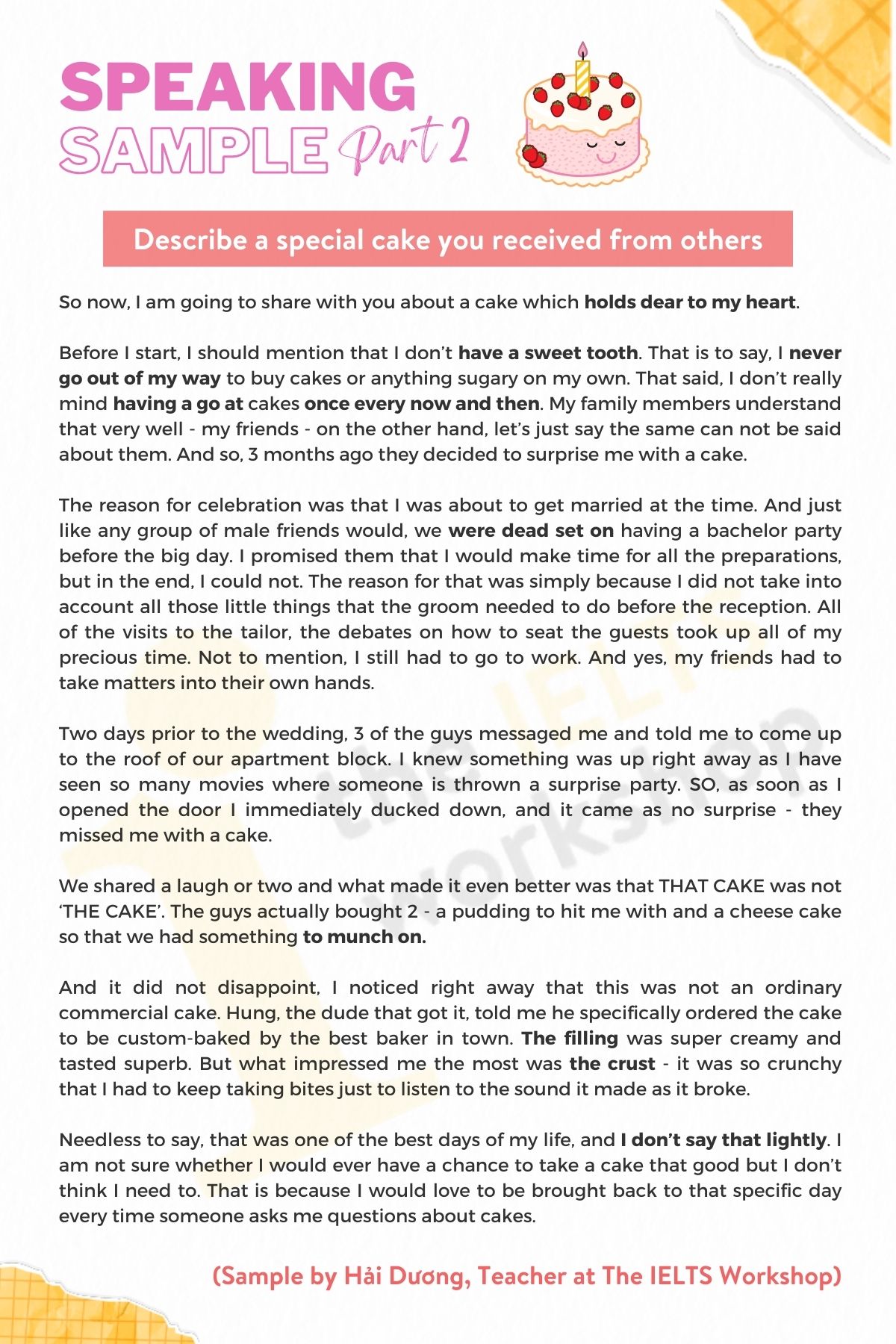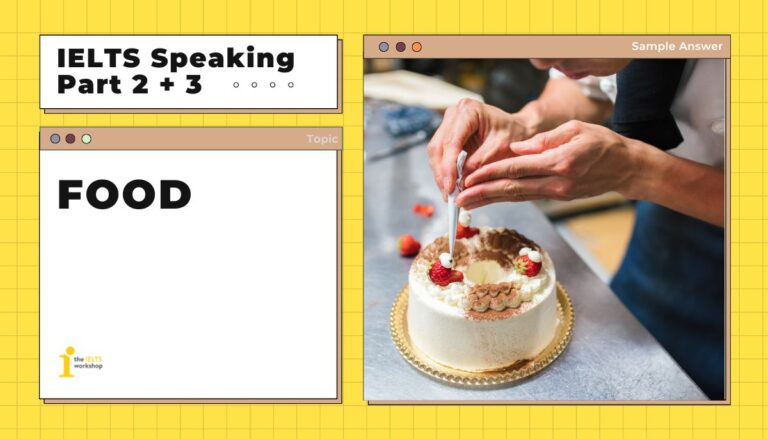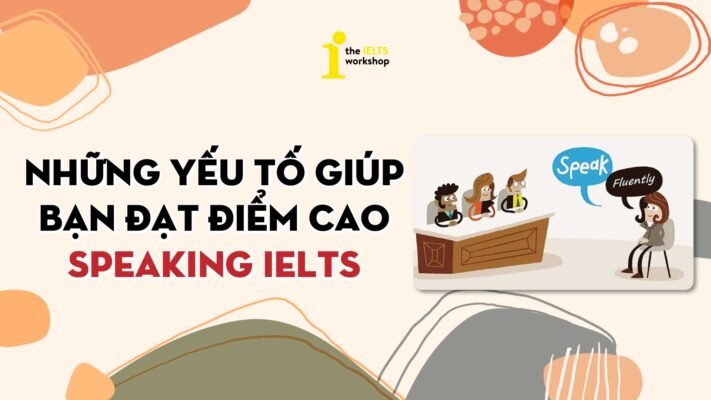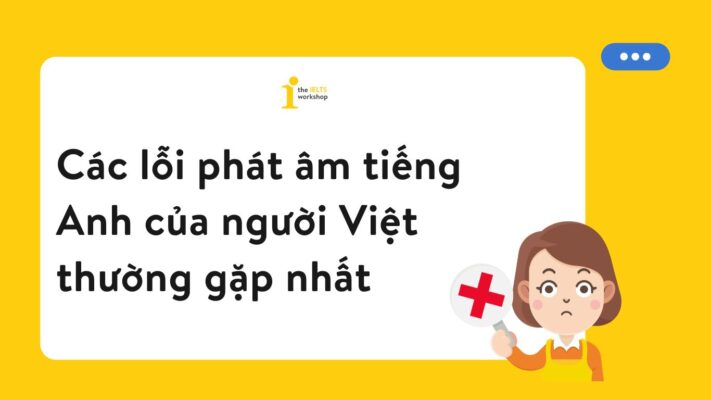Trong chuyên mục giải đề IELTS Speaking lần này, thầy Hải Dương của The IELTS Workshop sẽ hướng dẫn bạn trả lời câu hỏi của chủ đề trong Speaking Part 2: Describe a special cake. Cùng tham khảo sample, từ vựng theo chủ đề và một vài cách diễn đạt ghi điểm nhé.
Part 2: Describe a special cake you received from others
Describe a special cake you received from others
You should say:
When it happened
Where it happened
Who you got the cake from
And explain why it was a special cake
Dưới đây là bài mẫu của thầy Hải Dương cho topic “Describe a special cake you received from others” dành cho các bạn tham khảo. Bài mẫu phù hợp cho những bạn đặt mức điểm đạt được là 6.5+.
1. Bài mẫu (Sample Answer)

2. Từ vựng (Vocabulary Highlight)
- To hold dear to my heart: giữ trong tim, yêu quý
- To have a sweet tooth: thích ăn đồ ngọt
- To go out of sb’ way to do something: cố hơn bình thường để làm 1 điều gì đó
- To have a go at something: thử làm gì đó
- Once every now and then: thỉnh thoảng 1 dịp
- Be dead set on: quyết tâm làm gì đó
- To munch on something: nhai cái gì đó
- The filling: nhân bánh
- The crunch: vỏ bánh
Câu hỏi cho chủ đề Food – Part 3
Bên cạnh Part 2, bạn hãy tham khảo thêm Part 3 cho chủ đề này nhé
1. What are the differences between special food in Vietnam and other countries?
2. Is there any food in your country that is eaten at special times or on special occasions?
3. Why are some people willing to spend a lot of money on meals on special days?
4. Do you think it’s good to communicate when eating with your family?

1. What are the differences between special food in Vietnam and other countries?
Honestly, I don’t know the first thing about culinary arts so don’t take it from me. However, I do believe that there are some key differences between the foods we cook and those in other places. First off, I’m certain we have more kinds of spices which the cooks are able to further combine to create a unique taste to most of our traditional dishes. I think you might have tried Bun-Cha so you know what I am talking about. Additionally, most of our traditional snacks are made with healthy food options such as beans and fish. I guess our ancestors were quite advanced in this aspect.
- Culinary arts: nghệ thuật ẩm thực
2. Is there any food in your country that is eaten at special times or on special occasions?
I am pretty sure that we have a different kind of food for every big event throughout the year. For Tet, our biggest festival of the year, we have Chung Cake – which is basically glutinous rice, pork and green beans wrapped together in banana leaves. It may take 20 to 30 hours to Chung cakes to be perfectly cooked. Then, for the Mid Autumn festival we have Moon Cakes which are so good that I don’t understand why they are only made at that time of the year.
3. Why are some people willing to spend a lot of money on meals on special days?
I think that this question answers itself really. I mean, we do not call them SPECIAL DAYS for no reason. Having fancy food options on the table during these days can be seen as a way one rewards himself with. Additionally, on special occasions people have a tendency to visit one another. So, having some extravagant delicacies can help you show off your hospitality.
4. Do you think it’s good to communicate when eating with your family?
Well, from a scientific point of view, it is ill-advised to carry out conversation during meals. The reason for that is that divided attention will interfere with the way the digestive system works. I know that the effect can’t be felt immediately but experts have pointed out that if you do this regularly, it would eventually lead to chronic stomach problems.
That said, I believe that there are some pros to speaking to your family during meals. The dinner table is now the only place where a lot of families can actually see one another. This should be seen as an opportunity for these people to catch up on what the others are doing with their life.
- It is ill-advised to: không nên làm gì đó
Bài mẫu bởi thầy Hải Dương – Giáo viên The IELTS Workshop HN
Trên đây là những nội dung bạn có thể tham khảo khi luyện tập chủ đề Food trong IELTS Speaking Part 2 và Part 3. Tham khảo thêm cho chủ đề Food tại Bài mẫu Part 1.
Ngoài ra, để có thể xác định được trình độ tiếng Anh của bản thân, bạn có thể làm bài TEST TRÌNH ĐỘ hoàn toàn miễn phí của The IELTS Workshop.
Nếu bạn đang gặp khó khăn chưa có phương pháp trả lời trong IELTS Speaking Part 3, bạn có thể tham khảo lộ trình học tại khóa Senior của The IELTS Workshop để được định hướng lộ trình học tập ngay nhé.









